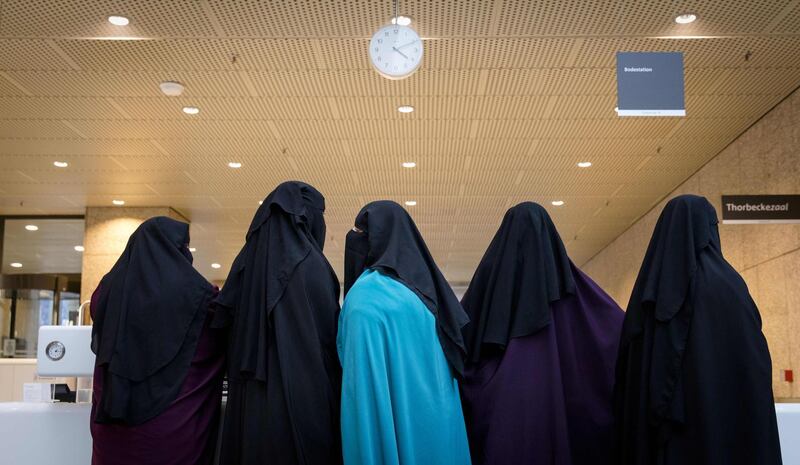In the 13 years since the People's Party for Freedom was first created, the issue of the burqa ban has moved from a discussion on the far-right fringes in the Netherlands to a political reality, mirroring the rise of both the party and its founder.
Now that the ban has come into force across the country – its official name is the Partial Ban on Face-Covering Clothing Act – anyone wearing a full-face motorcycle helmet, balaclava, ski mask or niqab in a public building or on public transport can be fined the equivalent of $167. Although on paper, the ban doesn't target any particular religious group, Party for Freedom founder Geert Wilders has made it his mission in life to weed out what he calls "the Islamisation of the Netherlands". He has compared the Quran to Hitler's Mein Kampf and tried to block the building of new mosques.
It seems to matter little that there are as few as 100 women in the whole of the Netherlands wearing the burqa or niqab, out of a population of about 17 million. The ban isn't about solving a particular problem. Instead, it is about signalling a particular attitude. Dutch centrist politicians have been spooked by the rise of far-right sentiment across Europe and the way in which Wilders has polarised popular opinion in the Netherlands. They have alighted on the burqa ban as a way of demonstrating a tough stance on immigration and playing to growing anti-Muslim sentiment. When the law was first mooted in 2016, it was purported to be for safety reasons. In reality, it was a reflection of the fact Wilders' party was by then the third largest in parliament and the main ally of the minority coalition government. A ban on religious clothing was a way of stealing the clothes of the far-right and ostensibly wearing them to appeal to its supporters.
That has been the pattern for other burqa bans across Europe, with politicians seeking to punish a minority group as a very visible means of appeasing the rising far right. In May, Austria approved a ban on headscarves in primary schools. Typically, the language was studiously impartial, referring to “religiously influenced clothing which is associated with the covering of the head”. Yet the government clarified it would not apply to the Sikh patka nor the Jewish kippah. And despite the generic description of banned items, politicians lined up to say the law was a “signal against political Islam” and a bid to stop “parallel societies”.
Other countries that have banned the face veil include Denmark, Belgium, France and Bulgaria. In the Netherlands, police and public officials have vowed not to enforce it, saying they have far more important work to do. Rotterdam mayor Ahmed Aboutaleb complained: “There are so many laws and not enough police officers. Rotterdam has bigger problems – murder, drugs, the undermining of society.” But in a way, arguing that the burqa ban won't solve anything or will only apply to a tiny minority is beside the point. The law is not intended to send a strong message to the few women who cover their faces; it is instead meant to deliver a political signal to millions more of the electorate.
Wilders, the architect of the proposal, who has a criminal conviction for inciting discrimination, was absolutely explicit about his intentions, tweeting last week when the ban came into force: “Now we can start working on the next step: a headscarf ban in the Netherlands.”
In doing so, he made a mockery of the security justification for the ban, because headscarves leave the face uncovered. His triumph in getting the burqa banned is really the failure of centrist politics. Anti-immigration sentiment is rising across Europe and centrist parties are scrambling to stop voters flocking to right-wing parties. In many European countries, the response has been to adopt language or policies previously associated with the hard right.
That is what happened last month in Greece, where the centrist-right New Democracy party gained power by taking a hardline stance on immigration and thereby sidelined the far-right Golden Dawn. And that is the real political context behind the burqa ban - not security concerns or community cohesion but raw political calculation. Even though it was a far-right party that first proposed the Dutch burqa ban, it was the centre-right People's Party for Freedom and Democracy that pushed it through.
By adopting the previously fringe policies of the hard right, centrist parties hope to be able to appease anti-immigrant sentiment without actually having to make substantial changes. That could lead to voters being swayed by such signals seeing centrist parties as defenders of some amorphous sense of patriotism or culture.
There are several dangers to this approach, not least that it undermines the values of tolerance that many in the Netherlands are justly proud of. It also gives excessive power to conservative views within the Muslim community and undermines a wider sense of community cohesion by pitting one group against another.
There are also political dangers, chiefly that normalising far-right sentiment might actually empower those views, not diminish them.
Having centrist parties adopt extreme positions on immigration or the burqa could, in theory, draw the sting from those issues and reduce their effectiveness as political platforms. In other words, by adopting the language and some of the policies of the far right, those right-wing parties could be neutralised and sidelined.
But it is equally possible that adopting such policies normalises them and European voters begin to believe in the logic of the hard right and in its ideology of nativism and nationalism. Centrist parties might then be forced to keep drifting further to the right to stay relevant.
With the burqa ban, the Dutch government is giving the public a taste of far-right policies. They might find that the public's appetite for far-right ideas simply grows as a result.





